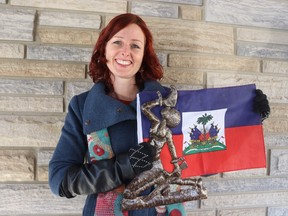
The executive director of Sarnia-based Rayjon Share Care says she’s stepping down in June to begin a new adventure on the West Coast.
Advertisement 2
Article content
Heather Smith announced this month she’s leaving the development and social justice charity that works with partners in Haiti and the Dominican Republic.
Article content
“It’s actually going to be hard,” she said. “I tell everyone this is the best job ever. I really have loved every minute, (but) it’s time for a new adventure for me personally and for my family.”
They are moving to BC later this year, she said.
“Part of being a leader is being ready to know when it’s time to pass the torch,” said Smith, who feels it’s time for “some fresh eyes” at Rayjon.
The volunteer-based, grassroots organization was formed in 1986 in Sarnia by Ray Wyrzykowski and John Barnfield after a “poverty awareness trip” to Haiti. The executive director is the only full-time staff member in Canada, Smith said.
Advertisement 3
Article content
It has three partner organizations in the Dominican, three more in two different regions of Haiti, and an annual operating budget of about $600,000 funding programs in education, health care, development, and empowering women.
Rayjon also has a project delivering glasses to Caribbean countries.
The bulk of its funding comes from individual donors, with some grants from long-standing relationships with funding agencies, Smith said. About 10 per cent comes from Sarnia area fundraisers.
“I would say our biggest role is in solidarity,” Smith said. “We come alongside for a time with our partners to help them achieve their goals. It’s very community-driven.”
Smith attended the former Sarnia Collegiate Institute and Technical School (SCITS), worked in health care and community wellness, and studied non-profit management at Western University.
Advertisement 4
Article content
“In 2015, I got in touch with Rayjon because I was looking for some volunteers and board work with an organization. . . working on a cause I cared about,” she said.
Having grown up in Sarnia, Smith knew about Rayjon and had previous experience in international development, including volunteering with another agency working in the Dominican.
“I thought Rayjon’s probably a good fit,” she said.
So she went to a meeting, asked how she could help and started out as a volunteer and board member.
“About a year later, the executive director role came up, so I applied and I’ve had that role since 2016,” Smith said.
Rayjon grew up during his tenure, Smith said. “I’m proud of what we’ve accomplished together.”
Highlights include working with Sarnia-area Rayjon volunteers and a “network of social advocates and professionals working in international collaborations all across Ontario, and of course our Haitian and Dominican partners,” she said.
Advertisement 5
Article content
“It actually hard to express how important they’ve become to me,” Smith said. “(They’re) more like family than colleagues now. They’re people I’ve worked with, laughed with and learned with.”
Another highlight, she said, has been the “gift” of “a front-row seat to see the dreams of our Haitian and Dominican partners become reality in the face of so many injustices that are really hard to imagine here from our comfy homes in Canada.”
One example is a Haitian rural women’s federation Rayjon has partnered with for decades, she said.
“Just in the last five years, they became officially recognized as an independent organization in Haiti,” Smith said.
“They became landowners with their own funds. . . (and) with the support of Canadian partners like Rayjon, they have built a grain-processing factory and a sustainable tree nursery that today is actually improving food security.”
Advertisement 6
Article content
“They’re combating climate change” and providing “a reliable source of income for the women” that “gets reinvested back into their community and other initiatives,” she said.
And they accomplished that “during the most tumultuous period of Haitian history,” Smith said. “I’ve had the privilege of witnessing their wins.”
Haiti, said to be the Western Hemisphere’s poorest country, also struggles with gang violence, political unrest and damage left from recent earthquakes and tropical storms.
“It just makes everything harder,” for Rayjon’s partners there, Smith said. “Sourcing equipment, getting from point A to point B safely” is more difficult, “but it hasn’t stopped progress.”
Communities are banding together and figuring out local solutions to problems, she said.
“And they’re doing that in spite of the crisis,” Smith said. “So, it’s pretty incredible to see.”
A team has formed at Rayjon to recruit the next executive director and Smith said she will stay on during the transition.
“We aim to help the successful candidate get started in the spring,” she said.
Article content
